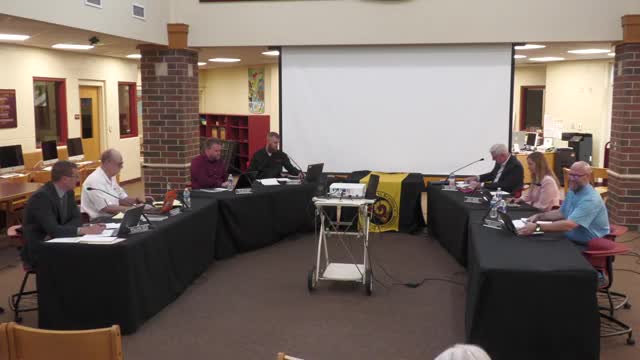Ross Local board previews broad policy changes tied to recent state bills, will vote in May
Get AI-powered insights, summaries, and transcripts
Subscribe
Summary
Superintendent Doctor Rice reviewed multiple policy updates that would implement recent state bills — including House Bill 8 (the "Parents' Bill of Rights") and fixes to Senate Bill 29 — and told the board it will vote on the package at the May meeting.
Doctor Rice, Ross Local School District superintendent, told the school board that a large package of policy changes driven by recent legislation from Columbus will come to the board for formal votes in May. "There is a lot being talked about right now and a lot coming out of Columbus," she said, and warned the board to expect "10, 12, maybe 15 pieces of policy at each of the next few meetings."
Why it matters: the proposed changes affect multiple areas of school operations including virtual committee meetings, purchasing procedures, student expulsions, medication policies, release time for religious instruction, acceptable use of district technology, and parental-notice requirements tied to what the superintendent described as the Parents' Bill of Rights (House Bill 8). The superintendent said the district will only vote after additional review and that most items are procedural updates or statutory compliance items.
Key points from the discussion: Doctor Rice summarized specific policy updates the district staff drafted for board review. On policy BCE (board committees), she said the changes reflect House Bill 257 and allow virtual committee meetings if the board provides 72-hour notice, public access, roll-call votes for actions, and 48-hour advance notice from any member who will attend virtually. On student expulsions (policy JGE), Rice said the policy would permit longer expulsions where a student is a threat to self or others and described required safeguards, including medical clearance before return. On medication (policy JHCD) she said changes are largely semantic and clarify prescription/over-the-counter rules and that some students may carry epi-pens and seizure medications.
Rice described JEF B (release time for religious instruction) as implementing a provision commonly called the Lifewise process, allowing parent-driven release time courses and permitting boards to require criminal-record checks for outside instructors or volunteers. On EDE (computer/online services), she said the draft incorporates fixes to Senate Bill 29 that clarify monitoring, definitions of educational records and technology providers, and device-monitoring rules.
Doctor Rice framed the Parents' Bill of Rights (House Bill 8) as the driver of many of the remaining policies (IGBLA, GBH, JM, IGAH, IGAI, IJ, JHC, JHCA, JHF). She said the law emphasizes parental decision-making about a child's upbringing and education and requires new notice and opt-out procedures when districts teach material not strictly tied to state-adopted standards. "As long as we are teaching state standards, we are fine," Rice said, adding that deviation from state standards for controversial topics may require additional parent notification and board-level processes.
Board members asked clarifying questions about specifics. One board member asked whether inhalers/puffers would be allowed to be carried; Rice said some students keep their own devices while the district retains certain medications for students whose parents request school control. Another trustee asked about conflicting parental views on names/pronouns; Rice said current and proposed state bills could restrict local discretion and cited ongoing legislative proposals about pronouns and notification requirements.
Next steps and constraints: Rice said the board will see formal policy drafts and will vote at the May meeting. She emphasized that many provisions are derived directly from state bills and that staff will bring recommended policy language for the board to consider. She also warned that the biennial budget process often includes unrelated provisions that can change district obligations once the budget bill is finalized.
Ending: The board did not vote on these policies at the meeting; Doctor Rice said the items will return for formal action in May after further staff review.
